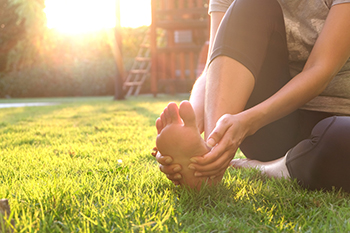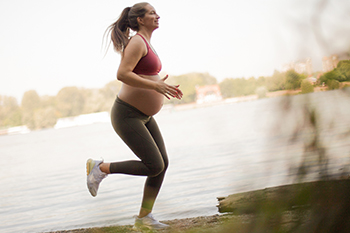Items filtered by date: October 2023
The Seriousness of Foot Pain

Foot pain can be more than just an inconvenience, it can be a warning sign of underlying health issues. Various health conditions can manifest through foot pain. For instance, a malfunctioning thyroid gland can affect nerve sensation in your feet. Similarly, degenerative changes in your lower back could irritate spinal nerves, impacting foot health. Peripheral arterial disease, or PAD, results from plaque buildup in leg arteries, causing foot pain and increasing the risk of heart attack and stroke. Rheumatoid arthritis is another culprit that can result in foot and ankle symptoms and severely alter the shape of your feet over time. Additionally, gout results from uric acid buildup, causing intense foot pain. Diabetes can damage nerves and blood vessels in the feet, leading to numbness and infections. Ignoring foot pain can be perilous. Not only could it indicate a localized issue, but it may also be a symptom of more systemic health problems. Therefore, if you have chronic or severe foot pain, it is strongly suggested that you make an appointment with a podiatrist for a proper diagnosis and individualized treatment.
Foot Pain
Foot pain can be extremely painful and debilitating. If you have a foot pain, consult with Ramin Nadjafi, DPM from Advanced Podiatry Group. Our doctor will assess your condition and provide you with quality foot and ankle treatment.
Causes
Foot pain is a very broad condition that could be caused by one or more ailments. The most common include:
- Bunions
- Hammertoes
- Plantar Fasciitis
- Bone Spurs
- Corns
- Tarsal Tunnel Syndrome
- Ingrown Toenails
- Arthritis (such as Gout, Rheumatoid, and Osteoarthritis)
- Flat Feet
- Injury (from stress fractures, broken toe, foot, ankle, Achilles tendon ruptures, and sprains)
- And more
Diagnosis
To figure out the cause of foot pain, podiatrists utilize several different methods. This can range from simple visual inspections and sensation tests to X-rays and MRI scans. Prior medical history, family medical history, and any recent physical traumatic events will all be taken into consideration for a proper diagnosis.
Treatment
Treatment depends upon the cause of the foot pain. Whether it is resting, staying off the foot, or having surgery; podiatrists have a number of treatment options available for foot pain.
If you have any questions, please feel free to contact our office located in Orlando, FL . We offer the newest diagnostic and treatment technologies for all your foot care needs.
Understanding Foot Changes During Pregnancy

Pregnancy is a transformative journey for a woman's body, which extends to her feet as well. As the body adapts to support the growing baby, several changes in the feet can occur. One common alteration is swelling, also known as edema, which is caused by increased blood and fluid volume. This can lead to a noticeable increase in foot size. Hormonal changes, specifically the hormone relaxin, can also affect the ligaments in the feet, potentially causing them to stretch and result in a broader foot shape. Weight gain during pregnancy adds extra pressure to the feet, often leading to fallen arches. These changes can be uncomfortable, but the good news is that they are usually temporary. Once the pregnancy is over, your feet will gradually return to their pre-pregnancy state. In the meantime, wearing comfortable, well-fitting shoes and having regular foot massages can help alleviate some of the discomfort and provide much-needed relief. If you are interested in learning more about how your feet can become affected by pregnancy, it is suggested that you confer with a podiatrist who can offer you useful information.
Pregnant women with swollen feet can be treated with a variety of different methods that are readily available. For more information about other cures for swollen feet during pregnancy, consult with Ramin Nadjafi, DPM from Advanced Podiatry Group. Our doctor will attend to all of your foot and ankle needs.
What Foot Problems Can Arise During Pregnancy?
One problem that can occur is overpronation, which occurs when the arch of the foot flattens and tends to roll inward. This can cause pain and discomfort in your heels while you’re walking or even just standing up, trying to support your baby.
Another problem is edema, or swelling in the extremities. This often affects the feet during pregnancy but tends to occur in the later stages.
How Can I Keep My Feet Healthy During Pregnancy?
- Wearing orthotics can provide extra support for the feet and help distribute weight evenly
- Minimize the amount of time spent walking barefoot
- Wear shoes with good arch support
- Wear shoes that allow for good circulation to the feet
- Elevate feet if you experience swelling
- Massage your feet
- Get regular, light exercise, such as walking, to promote blood circulation to the feet
If you have any questions please feel free to contact our office located in Orlando, FL . We offer the newest diagnostic and treatment technologies for all your foot and ankle needs.
Beginners Risk Overuse Running Injuries

One of the most common causes of running injuries is related to overuse. But what does that mean? An overuse injury occurs when tissue is damaged due to repetitive demand over a period of time. If you are new to running, starting slow and steady is extremely important. Begin with a combination of walking and running to ease your body into the sport. Gradual progression is key to preventing overuse injuries. Additionally, it is essential to keep track of your mileage. Avoid increasing mileage by more than 10 percent per week, as pushing too hard and fast can be a recipe for overuse injury. Running more than 45 miles per week may not necessarily boost performance and could heighten your risk of injuries. When choosing your running route, opt for soft, flat surfaces, when possible. Slanted or uneven terrain can increase the strain on your muscles and joints, increasing the risk of injury. Pain is the body's way of signaling a problem. If you experience pain while running, it is wise to take a break for a few days. Variation is also key to injury prevention. Alternating between hard training days and easy recovery days helps your body recover and adapt to the demands of running. It is important to remember your footwear, and replace running shoes every 500 miles. After this distance, your shoes may no longer provide adequate shock absorption, increasing the risk of injury. For help preventing or managing overuse injuries from running, it is suggested that you make an appointment with a podiatrist.
All runners should take extra precaution when trying to avoid injury. If you have any concerns about your feet, contact Ramin Nadjafi, DPM of Advanced Podiatry Group. Our doctor will treat your foot and ankle needs.
How to Prevent Running Injuries
There are a lot of mistakes a runner can make prior to a workout that can induce injury. A lot of athletes tend to overstretch before running, instead of saving those workouts for a post-run routine. Deep lunges and hand-to-toe hamstring pulls should be performed after a workout instead of during a warmup. Another common mistake is jumping into an intense routine before your body is physically prepared for it. You should try to ease your way into long-distance running instead of forcing yourself to rush into it.
More Tips for Preventing Injury
- Incorporate Strength Training into Workouts - This will help improve the body’s overall athleticism
- Improve and Maintain Your Flexibility – Stretching everyday will help improve overall performance
- “Warm Up” Before Running and “Cool Down” Afterward – A warm up of 5-10 minutes helps get rid of lactic acid in the muscles and prevents delayed muscle soreness
- Cross-Training is Crucial
- Wear Proper Running Shoes
- Have a Formal Gait Analysis – Poor biomechanics can easily cause injury
If you have any questions, please feel free to contact our office located in Orlando, FL . We offer the newest diagnostic and treatment technologies for all your foot care needs.
It's Time for Beautiful Feet
How Shoes Can Affect Your Foot Health

Proper footwear is essential for preventing various foot conditions and discomfort. Here are some key considerations to keep in mind when choosing your footwear. Those who stand for extended periods on hard surfaces like concrete may experience heel and forefoot pain and calluses and corns. Opt for supportive shoes with softer soles and arch support to alleviate these stresses. This helps distribute your weight more evenly and reduces pressure on the feet. If you have foot soreness, consider lace-up boots. These boots can help maintain leg alignment and distribute even pressure on the muscles and ligaments around your foot. While high heels may be fashionable, they can cause forefoot pressure and deformities. By limiting their use, you can promote better foot health. For those engaged in physical activities, look for shoes that provide cushioning for shock absorption during activities such as running and jumping. Flexibility at the ball of the foot and proper heel support are other essential features. For further help with taking care of your feet through appropriate footwear, it is suggested that you seek the help of a podiatrist.
Everyday foot care is very important to prevent infection and other foot ailments. If you need your feet checked, contact Ramin Nadjafi, DPM from Advanced Podiatry Group. Our doctor can provide the care you need to keep you pain-free and on your feet.
Everyday Foot Care
Often, people take care of their bodies, face and hair more so than they do for their feet. But the feet are a very important aspect of our bodies, and one that we should pay more attention to. Without our feet, we would not be able to perform most daily tasks.
It is best to check your feet regularly to make sure there are no new bruises or cuts that you may not have noticed before. For dry feet, moisturizer can easily be a remedy and can be applied as often as necessary to the affected areas. Wearing shoes that fit well can also help you maintain good foot health, as well as making it easier to walk and do daily activities without the stress or pain of ill-fitting shoes, high heels, or even flip flops. Wearing clean socks with closed shoes is important to ensure that sweat and bacteria do not accumulate within the shoe. Clean socks help to prevent Athlete’s foot, fungi problems, bad odors, and can absorb sweat.
If you have any questions please feel free to contact our office located in Orlando, FL . We offer the newest diagnostic and treatment technologies for all your foot and ankle needs.
Insights Into Hammertoe Surgery

Hammertoe surgery is a procedure aimed at correcting a common and often painful foot condition known as hammertoe. This condition causes one or more toe joints to become permanently bent, resembling a hammer. If conservative treatments fail to provide relief, foot surgery may be recommended. Hammertoe surgery comes in different forms, including tendon transfers, joint resections, and fusion, tailored to the severity and type of deformity. It is typically performed as an outpatient procedure, allowing patients to return home on the same day. Recovery time can vary, and patients can expect swelling and discomfort for a few weeks, with full recovery taking several months. Hammertoe surgery boasts a high success rate in relieving pain and correcting toe deformities. However, understanding the facts about hammertoe surgery is the first step towards making an informed decision about your foot health. If you have a hammertoe, it is strongly suggested that you are under the care of a podiatrist who can determine if this type of foot surgery is correct for you.
Foot surgery is sometimes necessary to treat a foot ailment. To learn more, contact Ramin Nadjafi, DPM of Advanced Podiatry Group. Our doctor will assist you with all of your foot and ankle needs.
When Is Surgery Necessary?
Foot and ankle surgery is generally reserved for cases in which less invasive, conservative procedures have failed to alleviate the problem. Some of the cases in which surgery may be necessary include:
- Removing foot deformities like bunions and bone spurs
- Severe arthritis that has caused bone issues
- Cosmetic reconstruction
What Types of Surgery Are There?
The type of surgery you receive will depend on the nature of the problem you have. Some of the possible surgeries include:
- Bunionectomy for painful bunions
- Surgical fusion for realignment of bones
- Neuropathy decompression surgery to treat nerve damage
Benefits of Surgery
Although surgery is usually a last resort, it can provide more complete pain relief compared to non-surgical methods and may allow you to finally resume full activity.
Surgical techniques have also become increasingly sophisticated. Techniques like endoscopic surgery allow for smaller incisions and faster recovery times.
If you have any questions please feel free to contact our office located in Orlando, FL . We offer the newest diagnostic and treatment technologies for all your foot and ankle needs.

